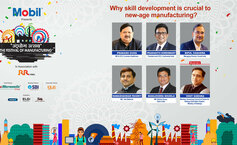
Two key challenges for India are Human Capital and Sustainable Resources. India needs to continue to raise the capabilities of its relatively young and fast-growing labour force. This entails upgrading education curricula, revamping vocational training programs and improving digital skills. Furthermore, India should continue to diversify its energy sources and reduce emissions as its manufacturing sector continues to expand. In 2014, the government launched the "Make in India" initiative, with the primary goal of making India a global manufacturing hub. The government has made a significant push to improve key enablers and move towards a more connected economy, most recently announcing a US$ 59 billion investment in infrastructure in 2017.
The Fourth Industrial Revolution will trigger selective reshoring, nearshoring and other structural changes to global value chains. Emerging technologies will change the cost-benefit equation for shifting production activities and, ultimately, impact location attractiveness. All countries must develop unique capabilities to make them attractive production destinations and capitalize on these shifts, the report said.
Readiness for the future of production requires global, not just national, solutions. Globally connected production systems need not only sophisticated technology but also standards, norms and regulations that cross technical, geographical and political boundaries, to release efficiencies and make it easier to do business across global value chains, the report added.
New and innovative approaches to public-private collaboration are needed to accelerate transformation. Every country faces challenges that cannot be solved by the private sector or public sector alone. New approaches to public-private collaboration that complement traditional models are needed to help governments quickly and effectively form partnerships that unlock new value.
END




































